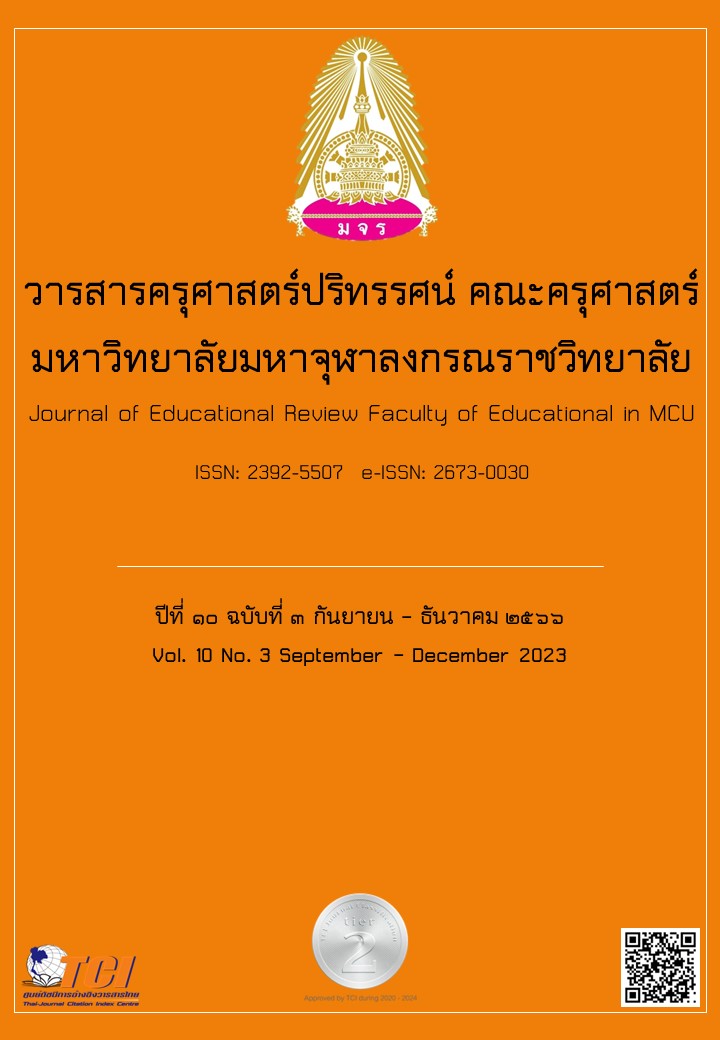THE PRIORITY NEEDS OF THE SOCIAL AND EMOTIONAL LEARNING SKILLS OF TRIAMUDOMSUKSAPATTANAKARN SCHOOL TEACHERS
Main Article Content
Abstract
The main objectives of this research were to: 1) study the current and desirable states of the social and emotional learning skills of Triamudomsuksapattanakarn school teachers; 2) study the priority needs of the social and emotional learning skills of Triamudomsuksapattanakarn school teachers. This study was conducted using a descriptive research approach. The population was Triamudomsuksapattanakarn school. The informants were a school director, 4 vice directors, and 207 teachers, totally 212. The research instrument was a questionnaire on the current state and the desirable state of Triamundompattanakarn school teachers’ social and emotional learning skills. The data were analyzed by frequency distribution, percentage, mean, standard deviation, and PNImodified. The research results showed that, overall, the current state of social and emotional learning skills was at a moderate level, while the desirable state was, overall, at the highest level. The research results also showed that the priority need index, overall, was 0.769 (PNImodified = 0.769), with the highest PNI modified on relationship skill (PNImodified = 0.931), followed by self-awareness (PNImodified = 0.809), and responsible decision making (PNImodified = 0.753), respectively.
Article Details

This work is licensed under a Creative Commons Attribution-NonCommercial-NoDerivatives 4.0 International License.
ทัศนะและความคิดเห็นที่ปรากฏในบทความในวารสารฉบับนี้ถือเป็นความรับผิดชอบของผู้เขียนบทความนั้นเพียงผู้เดียว และไม่ถือเป็นทัศนะและความรับผิดชอบของกองบรรณาธิการ
กองบรรณาธิการขอสงวนสิทธิ์ในการคัดเลือกบทความลงตีพิมพ์และจะแจ้งให้เจ้าของบทความทราบหลังจากผู้ประเมินบทความตรวจอ่านบทความแล้ว
ต้นฉบับที่ได้รับการตีพิมพ์ในวารสารครุศาสตร์ปริทรรศน์ คณะครุศาสตร์ มหาวิทยาลัยมหาจุฬาลงกรณราชวิทยาลัย ถือเป็นกรรมสิทธิ์ของคณะครุศาสตร์ มหาวิทยาลัยมหาจุฬาลงกรณราชวิทยาลัย ห้ามนำข้อความทั้งหมดหรือบางส่วนไปพิมพ์ซ้ำ เว้นเสียแต่ว่าจะได้รับอนุญาตจากมหาวิทยาลัยฯ เป็นลายลักษณ์อักษร
References
ชาญ สวัสดิ์สาลี. (2542). คู่มือนักฝึกอบรมมืออาชีพ : การจัดดำเนินการฝึกอบรมอย่างมีประสิทธิผล. กรุงเทพมหานคร: สวัสดิการสำนักงานคณะกรรมการข้าราชการพลเรือน.
เพชรยุพา บูรณ์สิริจรุงรัฐ. (2558). หลักการพัฒนาความฉลาดทางสังคม. กรุงเทพมหานคร: เฌ.เดียมอง.
มนูญ สรรค์คุณากร. (2562). ผู้บริหารสถานศึกษากับการพัฒนาตัวบ่งชี้ความฉลาดทางอารมณ์และสังคม. นนทบุรี: สถาบันการจัดการปัญญาภิวัฒน์
มะลิ ประดิษฐแสง. (2559). ความฉลาดทางอารมณ์และความฉลาดทางสังคมของอาจารย์ในพื้นที่ 3 จังหวัดชายแดนภาคใต้. สงขลา: สำนักงานคณะกรรมการการอุดมศึกษา.
วนิดา วาดีเจริญ. (2556). การจัดการทรัพยากรมนุษย์ จากแนวคิด ทฤษฎี สู่ภาคปฏิบัติ. กรุงเทพมหานคร: ซีเอ็ดยูเคชั่น.
สมศักดิ์ ดลประสิทธิ์. (2552). การปฏิรูปการศึกษาใหม่. กรุงเทพมหานคร: สวัสดิการสำนักงานเลขาธิการสภาการศึกษา.
สำนักงานเขตพื้นที่การศึกษามัธยมศึกษา กรุงเทพมหานครเขต 2. (2564). แผนปฏิบัติการประจำปีงบประมาณ 2564. กรุงเทพมหานคร: สำนักงานเขตพื้นที่การศึกษามัธยมศึกษา กรุงเทพมหานครเขต 2.
สำนักงานพัฒนาการเศรษฐกิจและสังคมแห่งชาติ. (2564). พระราชบัญญัติพัฒนาการเศรษฐกิจและสังคมแห่งชาติ. กรุงเทพมหานคร: สำนักงานพัฒนาการเศรษฐกิจและสังคมแห่งชาติ.
Best, John W. (1981). Research in Education. 4th ed. New Jersey: Prentice-Hall.
Goleman, D. (1995). Emotional intelligence: A new vision for educators. PsycEXTRA Dataset. https://doi.org/10.1037/e538982004-001.
Keyes, C. L. M. (1998). Social well-being. Social Psychology Quarterly. 61(2). 121–140. https://doi.org/10.2307/2787065
Oliveira. (2021). Impacts of social and emotional learning interventions for teachers on teachers' outcomes: A systematic review with meta-analysis. Frontiers in Psychology. 12. https://doi.org/10.3389/fpsyg.2021.677217.
Spilt, J.L., Koomen, H.M. and Thijs, J.T. (2011). Teacher wellbeing: The importance of teacher–student relationships. Educational Psychology Review. 23(4). 457–477.


